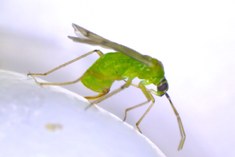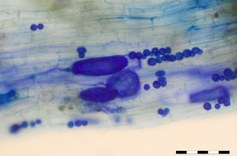Research domains
Macrobials

The Cropfit professors with expertise in macrobials study
- Mode of action of (bio)insecticides
- The development of rearing techniques for insects and mites and quality control
- Use of beneficial insects, mites and entomopathogenic nematodes in biocontrol
- Use of hormones, bioactive peptides and RNA interference in the control of insects
- The development of warning systems
Microbials

Microbial specialists of CropFit have a strong expertise in plant growth promoting microbials and biocontrol agents including:
- Pseudomonas
- Bacillus
- Rhizobium
- P-solubilizing bacteria
- Mycorrhiza
- Pirifomospora
- Trichoderma
- Verticillium
A strong focus of the research is set on endophytic fungi and bacteria.
CropFit has a unique collection of microbials that serves as source for new research projects.
Natural Molecules
The mode of action of humic and fulvic acids have been studied at the Ghent University during the past years. Plant extracts with insecticidal and fungicidal activity have been identified by CropFit experts. Isolation and characterization of bioactive natural compounds belong to the expertise of CropFit chemists as well as the synthesis of natural analogues. The role of plant hormones, plant proteins, amino acids and vitamins in plant defense and plant growth is studied within the scope of CropFit.
Semiochemicals
Green leave volatiles and fungal volatiles are being studied by CropFit for their biocontrol and plant growth promoting effect on different types of plants.
Growth regulators
CropFit experts study the effect of chemical analogues of natural compounds on plant growth. Analogues of cytokinins, pyrabactins and strigolactones are currently being studied. A screening assay has been developed to screen bioactive compounds on plant growth. A chemical library is available to discover new bioactive molecules.